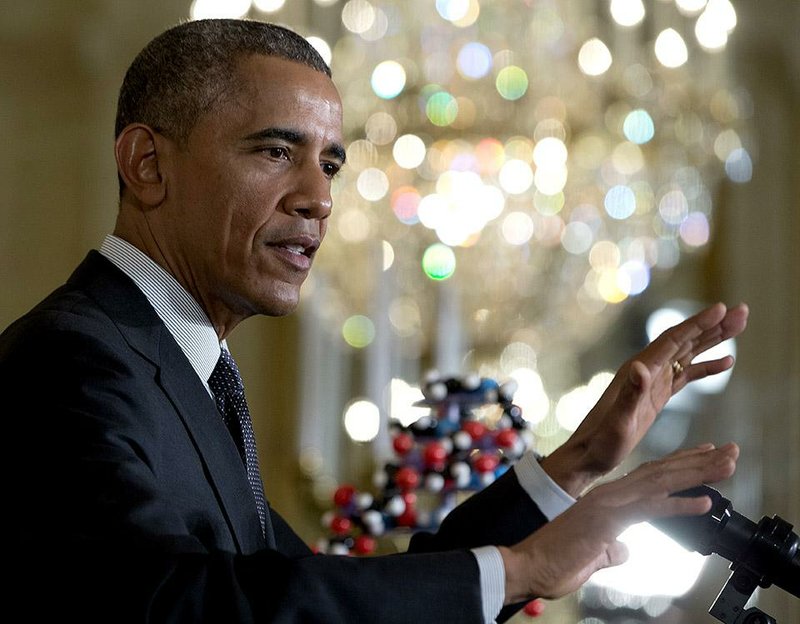WASHINGTON -- Declaring that "the possibilities are boundless," President Barack Obama on Friday announced a major biomedical research initiative, including plans to collect genetic data on a million Americans so that scientists can develop drugs and treatments tailored to the characteristics of individual patients.
Dr. Francis Collins, the director of the National Institutes of Health, said the studies would help doctors decide which treatments would work best for which patients.
White House officials said the "precision medicine initiative," also known as personalized or individualized medicine, would begin with a down payment of $215 million in the president's budget request for the fiscal year that starts Oct. 1.
Precision medicine "gives us one of the greatest opportunities for new medical breakthroughs that we have ever seen," Obama said at a White House event attended by patients' advocates, researchers, and drug and biotechnology company executives.
"The time is ripe to unleash a new wave of advances in this area, in precision medicine, just like we did with genetics 25 years ago," Obama said.
One study of that earlier effort, he said, found that "every dollar we spent to map the human genome has already returned $140 to our economy."
The new research initiative, he said, can save lives, create jobs, foster new industries and help people overcome "the accidents and circumstances of our birth."
"If we're born with a particular disease, or a particular genetic makeup that makes us more vulnerable to something, that's not our destiny, that's not our fate," Obama said. "We can remake it. That's who we are as Americans, and that's the power of scientific discovery."
Researchers have been collecting and storing human tissue and other biological specimens since the 1990s in repositories known as biobanks.
"We do not envision this as being a biobank, which would suggest a single repository for all the data or all the samples," said Jo Handelsman, associate director of the White House Office of Science and Technology Policy.
"There are existing cohorts around the country that have already been started and have rich sources of data," she said. "The challenge in this initiative is to link them together and fill in the gaps."
Federal officials described the project as a research consortium that would collect information from large numbers of people. The data could include medical records, laboratory test results, profiles of patients' genes, and information about their diets, tobacco use, lifestyles and environments.
The president's budget request, to be introduced Monday, includes $130 million for the consortium, White House officials said.
In addition, they said, Obama will request $70 million for the National Cancer Institute, the largest of the National Institutes of Health units, to investigate genes that may contribute to the risk of developing certain types of cancer, and then to use that knowledge to develop more effective treatments.
Obama also plans to request $10 million for the Food and Drug Administration, which regulates the technology that is used to analyze DNA.
Such analysis can identify millions of genetic variants, with results that could help diagnose or treat some diseases, officials said.
The budget request also includes $5 million for health information technology so that researchers can safely exchange data while protecting privacy.
"We're going to make sure that protecting patient privacy is built into our efforts from day one," Obama said. "And I'm proud we have so many patients' rights advocates with us here today. They're not going to be on the sidelines. This is not going to be an afterthought. They'll help us design this initiative from the ground up, making sure that we harness the new technologies and opportunities in a responsible way."
Mark Fleury, a policy analyst at the American Cancer Society's Cancer Action Network, welcomed the initiative.
"Cancer," he said, "is a disease of faulty genes. The goal of personalized medicine is to understand the unique characteristics of individual patients so therapies can be tailored to genetic mutations that underlie their disease."
Collins said the initiative was feasible because of advances in genetics and cell biology, the use of electronic medical records, significant increases in computing power and a sharp decline over the last 15 years in the cost of a laboratory technique known as DNA sequencing.
The technique is used to investigate the functions of genes and to analyze the full set of a person's genes -- the genome.
"It cost us $400 million for that first genome," Collins said. "Now a genome can be sequenced for a cost approximating $1,000."
A Section on 01/31/2015

